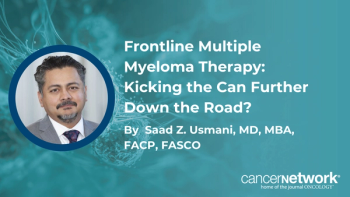
- ONCOLOGY Vol 11 No 10
- Volume 11
- Issue 10
Patients with Multiple Myeloma Needed For NCI Study of New Agent Used to Reverse Resistance to Chemotherapy
The Eastern Cooperative Oncology Group (ECOG), The National Cancer Institute’s (NCI) clinical trials cooperative group,
The Eastern Cooperative Oncology Group (ECOG), The National Cancer Institutes (NCI) clinical trials cooperative group, is conducting a study in which PSC 833, a new cyclosporin D analog, plus vincristine, doxorubicin, and dexamethasone (VAD) is being compared with VAD alone in the treatment of relapsing or refractory multiple myeloma. ECOG is coordinating this randomized trial, with participation from the Southwestern Oncology Group (SWOG), Cancer and Leukemia Group B (CALGB), and the National Cancer Institute of Canadas Clinical Trials Group (NCIC CTG). This study began accepting patients in March 1997 and is seeking a total of 360 patients.
After a period of time, patients with multiple myeloma often develop a multidrug resistance (MDR). This study will examine if PSC 833, in combination with standard therapy, can help overcome MDR in patients with multiple myeloma either at relapse or with refractory disease
The study will measure overall survival, event free survival, objective and subjective response. The subjective response will be defined by the patients performance status, pain, and measure of improvement in anemia.
Typically, when multiple myeloma is first diagnosed little resistance is seen, but usually, MDR occurs more frequently in patients with relapsing or refractory myeloma. Based on this observation, initial studies have been performed to determine if there is a way to alter MDR for multiple myeloma patients.
Initial clinical trials have demonstrated that PSC 833 is well tolerated and is able to reverse resistance to a variety of chemotherapeutic agents. In a phase I study performed at the Mayo Clinic, the University of Arizona, Stanford University and Loyola University, the Marshfield Clinic and H. Lee Moffit Cancer Center, 26 patients with multiple myeloma received oral PSC 833 in combination with standard doses of dexamethasone and escalating doses of vincristine and doxorubicin. The regimen was well tolerated at the final recommended doses, and five of 26 patients achieved a partial response.
Physicians can learn more about the study by contacting the study chair, Dr. William Friedenberg at the Marshfield Clinic, Marshfield, Wisconsin, (715) 387-5511. All institutions that are members of the participating cooperative groups (ECOG, SWOG, CALGB, and NCIC CTG) are eligible to participate in the study, pending institutional approval of the study. Patients will have to meet specific requirements to be eligible to participate.
Articles in this issue
over 28 years ago
Vinorelbine in Non-Small-Cell Lung Cancerover 28 years ago
Paclitaxel and Vinorelbine in Non-Small-Cell Lung Cancerover 28 years ago
Safety Data From North American Trials of Vinorelbineover 28 years ago
Cisplatin Alone vs Cisplatin Plus Vinorelbine in Stage IV NSCLCover 28 years ago
Current Management of Unresectable Non-Small-Cell Lung Cancerover 28 years ago
The Economics of Prostate Cancer ScreeningNewsletter
Stay up to date on recent advances in the multidisciplinary approach to cancer.






































